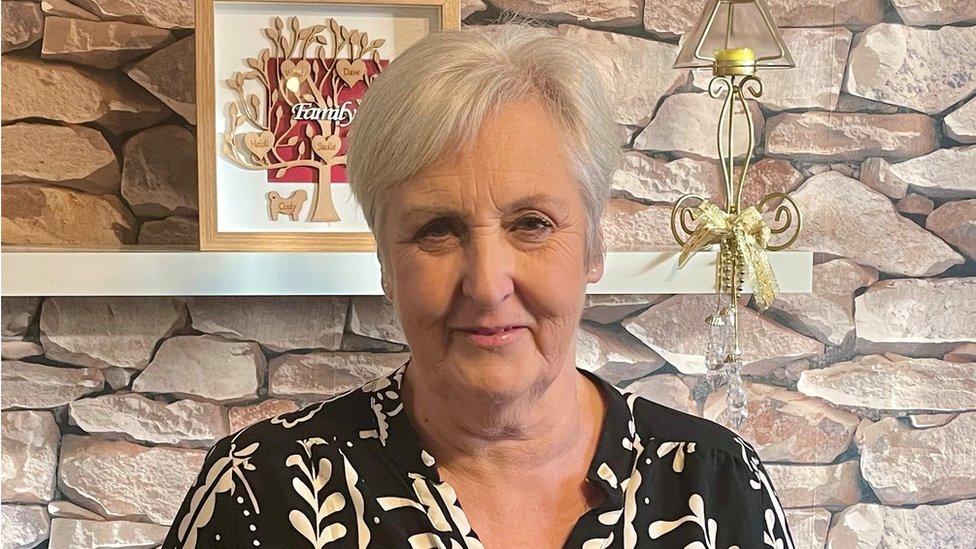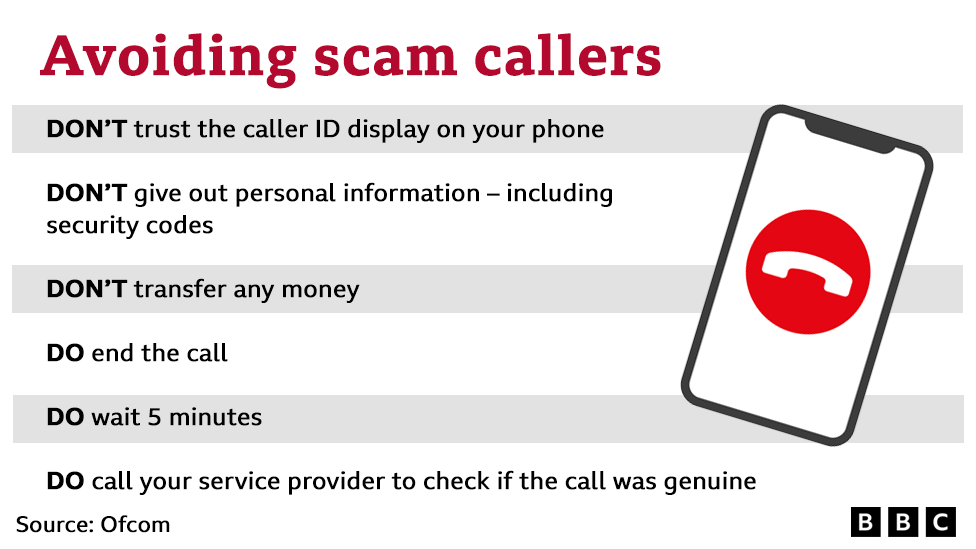Scammer told bank fraud victim 'you're so thick'
- Published

Wendy Falconer says she has had trouble sleeping since her shock phone call with a scammer
A woman had almost £400 stolen from her bank by a fraudster who then mocked her over the phone, telling her "you're so thick".
Wendy Falconer, 63, said she was left "shaking and crying" after the scammer mocked and swore at her.
She was caring for her husband at their caravan in Tywyn, Gwynedd, when the call came in pretending to be her bank.
Ofcom has warned against relying on caller ID to tell if calls are legitimate.
Mrs Falconer, who lives near Ludlow, Shropshire, said the call appeared to be coming from her bank's number, which she has saved in her phone.
Initially she said the scammer seemed "so professional" and knew details about her account and even warned her about the danger of scams.
But after he tricked her into telling him a security code that gave him access to her account, the scammer began mocking her over the phone.
"He was laughing, saying I was stupid, his language was unbelievable. And he said if you'd like to go to your app now, you'll see me take your money," said Mrs Falconer.
"Why did he need to do that? He'd already got the money.
"He was laughing so much at me and the language was just awful, calling me names.
"He said 'you're so thick, you're so stupid'. I was just in shock."

The scammer stole nearly £400 from her bank account during the episode in October last year, which came at a time when she was looking after her husband, Dave, who was recovering from heart surgery.
The couple have holidayed at their caravan in Tywyn for many years, with Mrs Falconer having visited the area since she was a child.
The money was eventually refunded by her bank, but Mrs Falconer said it was the abuse she received that left the most damage.
"I didn't sleep that night, because all I could hear was his voice, laughing at me and this abuse," she said.
"I felt violated by him. But if he just took my money, I think I would have coped with it, and thought 'I've been scammed'. It was what he did to me after."
She added: "It left me feeling so low, this man was so awful. I don't want it to happen to anybody else."

A scam tactic called spoofing allows fraudsters to disguise themselves with the phone numbers of legitimate organisations like banks
The practice of disguising a phone number, or making it appear as if a legitimate organisation is calling, is known as spoofing, external.
The communications regulator Ofcom said: "Never give out your personal information in response to an incoming call, or rely upon the caller ID as the sole means of identification, particularly if the caller asks you to carry out an action which might have financial consequences."
Det Con Rachel Roberts from North Wales Police, which is investigating the crime, said it was a common scam - adding that it was not just banks' phone numbers that could be mimicked.
"We also see victims being contacted by telephone with suspects claiming to be from Amazon and quite often other utility companies, Microsoft, maybe even Apple," she said.
"A few victims have reported to us that they've had phone calls purporting to be from their GP, or from their local pharmacy, asking for that victim to provide bank details so that they can pay for their prescriptions or pay for a delivery service."
Damon Rands, founder of cyber security company PureCyber, warned that scammers "always want to inject a sense of urgency and fear".
He said anyone who gets a call claiming something is wrong with an account or service should end the call, wait five minutes and then phone the provider, and "go to the website and make sure you're phoning the right number".
Or in the case of Amazon, "go to your account and it will tell you if there are any problems".
You can report scams to the ActionFraud website, external, which also contains information about different sorts of scams that are being carried out.

BINGE-WORTHY DRAMAS: Amazing worlds and spectacular stories, all filmed in Wales
THE CRASH DETECTIVES: Every serious incident on the road requires forensic examination

Related topics
- Published19 July 2023

- Published1 July 2023
- Published16 November 2023
